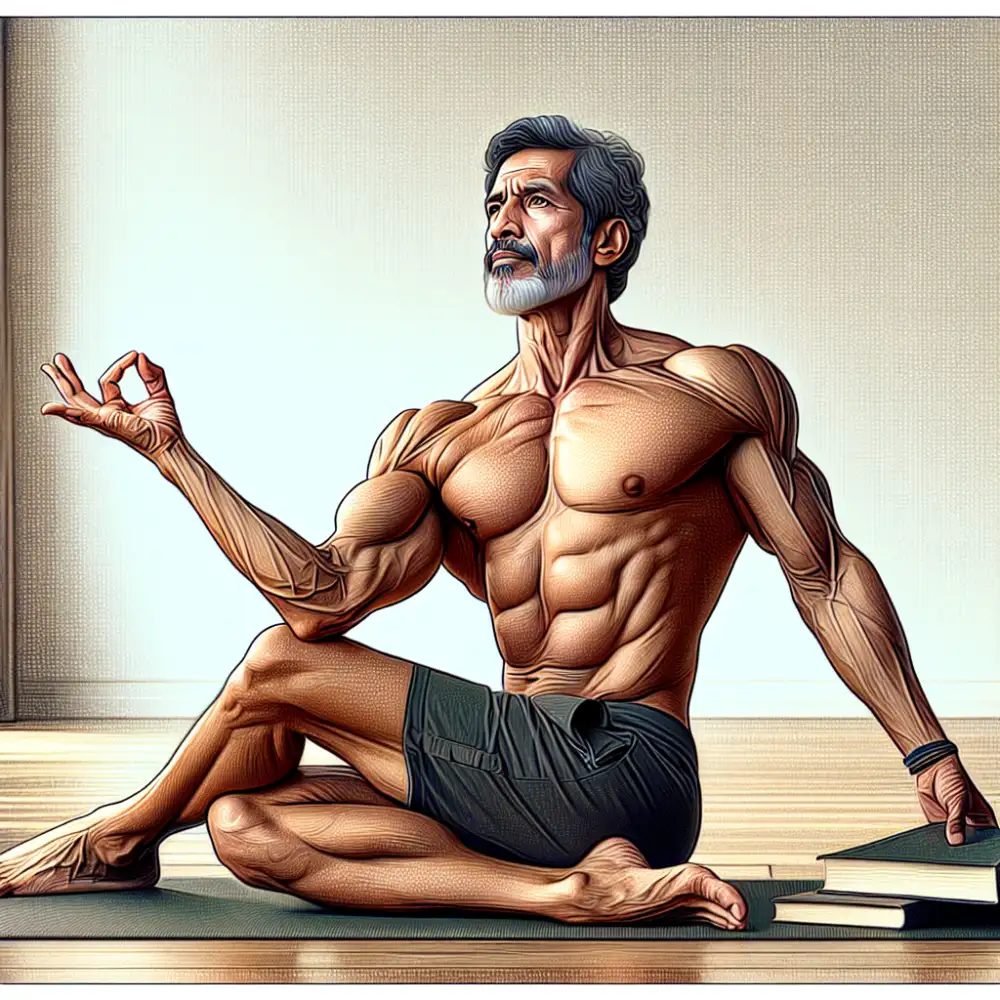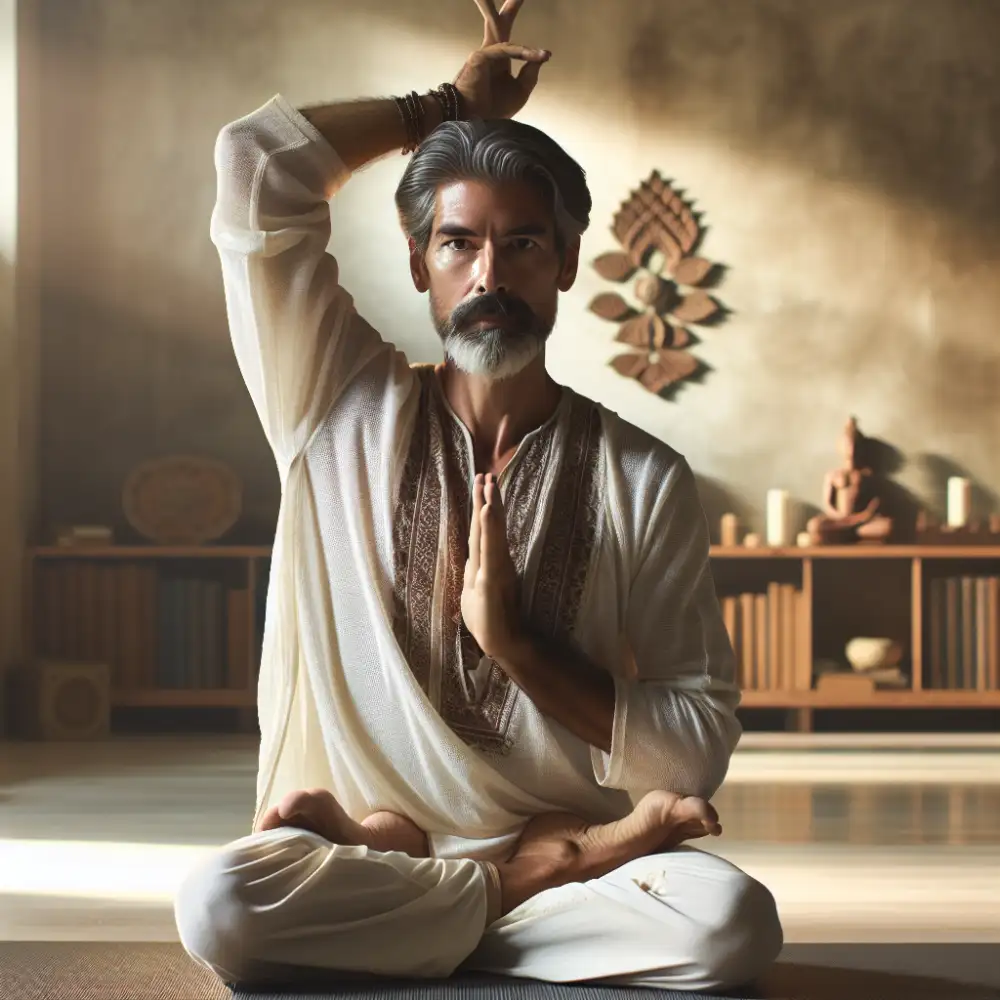Unlock Inner Peace and Strength with Yoga Teacher Adil Palkhivala

Adil Palkhivala: Yoga Master
Adil Palkhivala is a world-renowned yoga teacher, author, and passionate advocate for the transformative power of yoga. With over three decades of experience, Adil has touched the lives of countless students worldwide, inspiring them to deepen their practice and live with greater awareness, balance, and joy.
Born in Mumbai, India, Adil's journey into the world of yoga began at the age of seven under the guidance of B.K.S. Iyengar. This early immersion instilled in him a deep reverence for the tradition and a lifelong commitment to its study. His teaching reflects the depth of his experience, blending the precision and alignment of Iyengar Yoga with a compassionate and accessible approach.
Adil's teaching transcends the physical asanas, emphasizing the integration of breath, body, and mind. He believes that yoga is a practice for everyone, regardless of age, flexibility, or experience level. His classes are known for their clarity, humor, and insightful guidance, making even the most challenging poses attainable and transformative.
Beyond the mat, Adil is a dedicated student of Eastern philosophy and spirituality. He weaves these ancient teachings into his classes, offering students a holistic understanding of yoga's potential for personal growth and spiritual awakening. He is the author of several acclaimed books, including "Fire of Love," which explores the transformative power of yoga through the lens of the Bhagavad Gita.
Adil's passion for yoga extends beyond the studio. He is the founder of Courage of Care, a non-profit organization that brings the healing benefits of yoga to underserved communities. Through this work, he aims to empower individuals and foster a more compassionate and interconnected world.
Early Life and Inspiration
Born in Mumbai in 1925, Adil Palkhivala was a man of extraordinary intellect and passion. While he is best known for his prowess as a jurist and economist, his life was also deeply influenced by the ancient practice of yoga. Though not much is publicly documented about his personal journey with yoga, it is known that Palkhivala found solace and inspiration in its teachings. He was a firm believer in the holistic benefits of yoga, seeing it as a way to cultivate not just physical well-being but also mental clarity and spiritual growth. This belief was evident in his own life, marked by discipline, intellectual rigor, and a deep commitment to his principles.
While Palkhivala's professional life was dedicated to law and economics, his personal life was likely enriched by the wisdom of yoga. This blend of ancient practice and modern intellect likely contributed to his multifaceted personality and his ability to engage with complex issues in a profound and insightful manner.
Yoga Journey and Lineage

Adil Palkhivala’s journey with yoga began at the age of seven under the guidance of B.K.S. Iyengar. This early immersion instilled in him a deep reverence for the tradition and a passion for its transformative power. He studied diligently with Iyengar for over three decades, eventually becoming one of his most senior and respected students. Palkhivala’s lineage is rooted firmly in the Iyengar method, known for its precision, alignment, and therapeutic applications.
He carries forward the legacy of his teacher while infusing it with his own insights and experiences. He is known for his ability to make the practice accessible to students of all levels, emphasizing the importance of individual needs and variations. His teaching goes beyond the physical postures, encompassing the philosophical and spiritual aspects of yoga as a path to self-discovery and personal growth.
As an author, Palkhivala shares his knowledge and passion through his writings. His books provide clear and insightful guidance on yoga asana, pranayama, and philosophy, making them invaluable resources for practitioners and teachers alike. Through his teaching, writing, and workshops, he continues to inspire and guide students worldwide, carrying forward the lineage of his teacher and sharing the transformative power of yoga with the world.
Teaching Philosophy and Style
My teaching philosophy is deeply rooted in the belief that true learning is a transformative journey, not merely an accumulation of information. Just as Nani Palkhivala, my grandfather, used his profound understanding of the Indian Constitution to empower citizens and advocate for their rights, I aim to empower my students with the ancient wisdom of yoga to navigate the complexities of life.
My classes are a blend of traditional yogic principles and contemporary understanding of the body and mind. I believe in creating a safe and inclusive environment where students feel comfortable exploring their limits and celebrating their progress. My teaching style is detailed and alignment-focused, emphasizing the importance of breath work and mindfulness in every pose.
I draw inspiration from the ancient texts, weaving in philosophical insights to make yoga relevant to modern life. My goal is not just to guide students through a physical practice but to empower them with tools for self-discovery, resilience, and inner peace. I believe that the true magic of yoga unfolds when we take the practice off the mat and integrate its teachings into our daily lives.
Breathwork Emphasis
While there is no widely documented connection between legal scholar Nani Palkhivala and specific breathwork techniques, the intersection of yoga, breathwork, and mental clarity offers an interesting lens through which to view his legacy. Palkhivala, renowned for his sharp intellect and articulate arguments, undoubtedly understood the importance of focus and mental stamina.

Modern yoga practitioners often point to the power of pranayama, or breath control, in achieving mental clarity and focus. Controlled breathing can calm the nervous system, reduce stress, and enhance cognitive function – all qualities essential for a legal mind like Palkhivala's. Though we can't definitively link him to specific practices, it's fascinating to consider how the principles of breathwork, so central to yoga, might have played a role in his ability to command attention and articulate complex legal arguments with precision.
Alignment Focus
While seemingly disparate, the worlds of a legal luminary like Nani Palkhivala and a yoga teacher and author share a common thread: alignment. For Palkhivala, alignment resided in harmonizing economic policy with constitutional values, advocating for a just and equitable society. His eloquent arguments, often compared to a yogic balancing act, aimed to align India's burgeoning economic aspirations with the principles of social justice enshrined in its constitution.
Similarly, a yoga teacher seeks alignment – of the body, mind, and spirit. Through asanas (postures), pranayama (breathing techniques), and mindfulness practices, they guide students towards an internal harmony, a state of equilibrium that echoes Palkhivala's vision for a balanced society. Both pursuits, though expressed through different avenues, emphasize the importance of alignment as a fundamental principle for individual and collective well-being.
Injury Prevention
While there is no direct connection between the late Indian jurist and lawyer, Nani Palkhivala, and injury prevention in yoga, both emphasize the importance of mindful practice. Palkhivala, a renowned constitutional lawyer, was known for his meticulous approach and deep understanding of the law. Similarly, yoga, when practiced mindfully and with proper guidance, can help prevent injuries.
A qualified yoga teacher, like an author specializing in yoga, would emphasize the importance of:
Gradual progression: Starting slowly and gradually increasing the intensity and difficulty of poses is crucial to avoid overexertion.
Proper alignment: Correct alignment ensures that the body is positioned safely and effectively, minimizing the risk of strain or injury.
Listening to your body: Paying attention to your body's signals and respecting its limits is essential.
Modifications and props: Using modifications and props can make poses more accessible and reduce the risk of injury.
Breathing techniques: Proper breathing techniques oxygenate the muscles and calm the nervous system, promoting relaxation and preventing injury.
Just as Palkhivala advocated for a deep understanding of the law, yoga teachers encourage students to develop a deep understanding of their bodies and practice yoga safely and mindfully.

Mindfulness and Meditation
Drawing parallels between the life of a legal luminary like Nani Palkhivala and the principles of mindfulness might seem unusual at first glance. After all, Palkhivala is renowned for his fierce intellect, his command over constitutional law, and his compelling arguments that shaped India's economic policies. Yet, a closer look reveals a profound connection. Palkhivala's life, characterized by intense focus, unwavering dedication, and a deep-seated commitment to his values, resonates with the core tenets of mindfulness.
Imagine a yoga teacher guiding students to find stillness amidst the chaos of their thoughts, urging them to observe their breath, to be fully present in each moment. This very essence of mindfulness, of cultivating awareness and non-judgmental observation, is mirrored in Palkhivala's approach to his work. His meticulous research, his ability to analyze complex legal frameworks, and his unwavering focus on the task at hand reflect a mind trained in the art of presence.
Furthermore, the practice of meditation, a cornerstone of mindfulness, emphasizes cultivating inner peace and equanimity. These qualities were evident in Palkhivala's demeanor, even when faced with adversity or opposing viewpoints. His ability to remain calm under pressure, to engage in respectful discourse, and to maintain his composure even in the face of disagreement speaks volumes about his inner strength and resilience.
In essence, while Nani Palkhivala might not have been a yoga teacher or a meditation guru, his life offers a compelling testament to the power of mindfulness. His journey serves as an inspiration, demonstrating that the principles of presence, focus, and inner peace are not confined to the realm of spirituality but can be harnessed to achieve excellence in any field.
Benefits of Adil's Yoga
While Adil Najam Sethi is a well-regarded yoga teacher and author, it's important to clarify that there's no widely recognized yoga system or practice specifically known as "Adil's Yoga." The name "Adil" is often associated with the late Indian jurist and economist Nani Palkhivala, who, while a proponent of yoga's benefits, wasn't a yoga teacher himself.
It's possible there might be local or individual yoga instructors named Adil who have developed their own unique approaches. However, without specific context or information about a particular "Adil's Yoga," it's impossible to outline its supposed benefits.
Yoga, in general, offers numerous physical, mental, and emotional benefits, and many skilled teachers guide students on this path. If you're looking for a yoga practice, it's always best to research teachers in your area, considering their experience, style, and student feedback.

Books and Resources
For a deeper understanding of Adil Shapurji Palkhivala's legal brilliance and contributions to Indian democracy, "The Law and Practice of Income Tax" stands as a testament to his profound knowledge. This comprehensive text, co-authored with his mentor Sir Jamshedji Behramji Kanga, remains a cornerstone in Indian tax law.
| Feature | Adil Palkhivala |
|---|---|
| Occupation | Yoga Teacher, Author |
| Style of Yoga Taught | Purna Yoga |
Transitioning to the realm of yoga and mindfulness, exploring the works of renowned yoga teachers and authors can provide invaluable insights. Consider delving into the teachings of B.K.S. Iyengar, whose book "Light on Yoga" is considered a bible for practitioners worldwide. Another influential figure is T.K.V. Desikachar, son and student of the legendary Tirumalai Krishnamacharya. His book "The Heart of Yoga" offers a personalized approach, emphasizing the adaptation of yoga to individual needs.
For a contemporary perspective, look into the works of Sharon Salzberg and Tara Brach. Salzberg, a leading teacher of mindfulness meditation, shares her wisdom in books like "Lovingkindness" and "Real Happiness." Brach, a psychologist and meditation teacher, explores the integration of Buddhist teachings with Western psychology in books such as "Radical Acceptance" and "True Refuge."
Global Impact and Legacy
While seemingly disparate, the lives and works of Nani Palkhivala and a dedicated yoga teacher and author share a common thread: a profound impact that transcends geographical boundaries. Palkhivala, a renowned Indian jurist and economist, dedicated his life to upholding the Indian Constitution and advocating for social justice. His powerful voice resonated far beyond the courtroom, influencing legal and economic thought in India and abroad.
Similarly, a yoga teacher and author, driven by a passion for sharing the transformative power of yoga, can touch the lives of students from diverse backgrounds. Through their teachings, they disseminate ancient wisdom, promoting physical well-being, mental clarity, and spiritual growth. Their books, transcending borders, have the potential to become companions for seekers worldwide, guiding them on their personal journeys.
Both Palkhivala and the yoga teacher exemplify the power of individual dedication to create a positive global impact. Their legacies, though distinct, serve as an inspiration, reminding us that passionate individuals can indeed make a difference in the world, fostering understanding, promoting well-being, and leaving an indelible mark on the global stage.
Published: 11. 07. 2024
Category: Food



